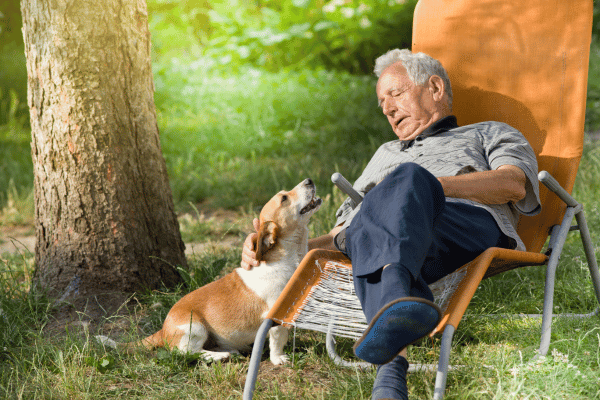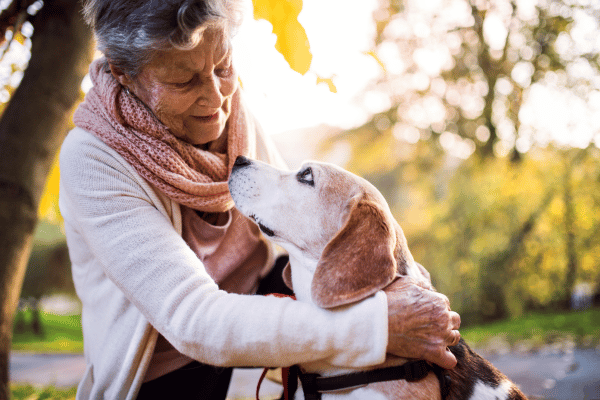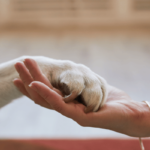Caring for senior dogs requires understanding and compassion. As they age, our canine companions face new challenges and health issues. This article, written with over 25 years of experience in pet care and veterinary insights, offers essential guidance for owners. Learn about the special needs of your aging dog, from health care adjustments to diet modifications, ensuring their golden years are comfortable and happy.
Understanding Your Senior Dogs Changing Needs

As dogs age, their needs evolve significantly. Its crucial to recognize these changes to provide the best care. Senior dogs often experience decreased mobility, making it harder for them to move around. Therefore, adjusting their living space to minimize strain is essential. This might include providing ramps for easier access to favorite spots or ensuring their bed is supportive and comfortable. Small changes can significantly improve their quality of life.
Dietary adjustments are also key in caring for senior dogs. As their metabolism slows, they may require fewer calories to avoid weight gain. However, their diet should still be rich in essential nutrients to support joint health and cognitive function. Consulting with a veterinarian can help you choose the right food and supplements. Remember, a balanced diet tailored to their age and health can make a big difference in their well-being.
Regular veterinary check-ups are vital for senior dogs. These visits allow for early detection and management of age-related health issues such as arthritis, heart disease, or vision and hearing loss. Your vet can also provide advice on pain management and lifestyle adjustments to suit your dogs needs. Caring for senior dogs involves a proactive approach to their health, ensuring they remain happy and comfortable throughout their senior years.
Enhancing Comfort in Your Dogs Senior Years
Comfort is paramount for senior dogs. As they age, they may seek softer, warmer places to rest. Investing in orthopedic dog beds can provide much-needed joint support, reducing discomfort from arthritis or other age-related conditions. Additionally, keep their environment warm and draft-free, as older dogs are more sensitive to cold temperatures. Small adjustments in their living space can significantly enhance their comfort, making their senior years more enjoyable and pain-free.
Exercise remains important for aging dogs, but it should be tailored to their abilities. Short, gentle walks are beneficial, helping maintain muscle tone and joint flexibility. Swimming can also be a great low-impact exercise for senior dogs. Always monitor their energy levels and avoid overexertion. Regular, appropriate exercise helps manage weight, improves mood, and maintains overall health. Remember, each dog is unique, so adapt activities to suit your senior dogs specific needs.
Mental stimulation is as crucial as physical exercise. Keeping your senior dog mentally engaged helps prevent cognitive decline. Simple activities like scent games or gentle play can stimulate their mind. Also, regular interaction and affection play a significant role in their mental well-being. Caring for senior dogs involves nurturing their mind as well as their body. By providing both mental and physical stimulation, you help maintain their quality of life as they age.
Caring for Senior Dogs: Health Monitoring Essentials
Regular health monitoring is crucial for senior dogs. As they age, they become more susceptible to various health issues. Owners should be vigilant for any signs of discomfort or illness, such as changes in appetite, water consumption, or bathroom habits. Early detection of health problems can make a significant difference in treatment effectiveness. Keeping a close eye on their health helps ensure that any concerns are addressed promptly, maintaining their well-being in their senior years.
Dental care is often overlooked but is essential for aging dogs. Dental problems can lead to other health issues, including heart disease. Regular brushing and veterinary dental check-ups can prevent these problems. Additionally, providing dental chews or toys can help maintain oral health. Good dental hygiene contributes to overall health, preventing pain and discomfort. Caring for senior dogs means paying attention to all aspects of their health, including their teeth and gums.
Finally, maintaining a consistent routine is comforting for senior dogs. They thrive on predictability, which helps reduce stress and anxiety. This includes regular feeding times, exercise, and rest periods. As they age, dogs may become more sensitive to changes in their environment or schedule. Keeping their daily routine consistent provides a sense of security and stability, which is especially important for their mental and emotional health during their senior years.
Adapting Your Home for Senior Dog Safety
Adapting your home to ensure safety for your senior dog is a key aspect of their care. As they age, their vision and mobility may decline, making them more prone to accidents. Consider installing non-slip mats in areas where they frequently walk to prevent slipping. Additionally, if your home has stairs, you might want to restrict access to prevent falls. These simple modifications can create a safer environment for your aging companion.
Another important consideration is the accessibility of essential areas. Ensure that food, water, and their bed are easily accessible without the need to climb or jump. Raised feeding stations can be particularly helpful for dogs with arthritis or neck pain. Its all about minimizing strain on their aging bodies. By thoughtfully arranging their living space, you can help your senior dog navigate their daily life with ease and comfort.
Lastly, consider the temperature and comfort of your home. Older dogs may struggle to regulate their body temperature, so its important to provide a warm, cozy space, especially in colder months. A heated bed or a soft blanket in their favorite spot can make a big difference. Caring for senior dogs involves creating an environment that caters to their changing physical needs, ensuring they remain comfortable and safe in their familiar surroundings.
Balancing Nutrition and Weight in Senior Dogs
Balancing nutrition and weight is vital for senior dogs. As they age, their dietary needs change, often requiring lower calorie intake due to decreased activity levels. However, their diet must still provide all the necessary nutrients. Opt for high-quality senior dog food that supports joint health and digestion. Regular weight checks are important to prevent obesity, which can exacerbate health issues like arthritis. A balanced diet keeps your senior dog healthy and active.
Consulting a veterinarian is key in managing your senior dogs diet. They can recommend specific foods and supplements based on your dogs health conditions and nutritional needs. Supplements like glucosamine can be beneficial for joint health, while omega fatty acids support cognitive function and skin health. Remember, each dog is unique, and what works for one may not work for another. Personalized dietary plans ensure your senior dog gets exactly what they need.
In addition to diet, hydration is crucial. Ensure your senior dog has constant access to fresh water. Older dogs may be more prone to dehydration, which can impact their overall health. Also, consider the texture of their food; softer foods can be easier for senior dogs to eat, especially if they have dental issues. Caring for senior dogs involves a holistic approach to their nutrition, keeping them healthy and comfortable in their advanced years.
Managing Mobility and Pain in Older Dogs
Mobility issues are common in senior dogs, often leading to pain and discomfort. Its important to manage these issues proactively. Regular, gentle exercise helps maintain joint mobility and muscle strength. Additionally, consider using joint supplements or anti-inflammatory medications as recommended by your veterinarian. These can alleviate discomfort and improve quality of life. Also, massage and physical therapy can be beneficial, providing relief and enhancing mobility in your aging canine companion.
Pain management is a critical aspect of caring for senior dogs. Be observant for signs of pain, like reluctance to move, whimpering, or changes in behavior. Your veterinarian can prescribe pain relief medications tailored to your dogs specific needs. Additionally, alternative therapies such as acupuncture or hydrotherapy can offer relief. Its all about finding the right balance of treatments to keep your senior dog comfortable without compromising their overall health.
Lastly, make your home more accessible to accommodate their mobility limitations. Ramps or steps can help them access higher places like beds or couches. Keep their living area on one floor if possible, to avoid the need for climbing stairs. Soft bedding can also provide extra cushioning for sore joints. By addressing mobility and pain issues, you can significantly enhance the quality of life for your senior dog.
Fostering Emotional Well-being in Aging Dogs
Emotional well-being is as important as physical health in senior dogs. As they age, they may experience changes in their behavior or mood. Its essential to provide them with a stable, loving environment. Regular affection and attention can greatly boost their spirits. Be patient with any behavioral changes and consult a veterinarian if you notice signs of anxiety or depression. Emotional support plays a crucial role in maintaining the overall health of your aging companion.
Social interaction is also key to their emotional well-being. If possible, allow your senior dog to interact with other dogs in a controlled, gentle manner. This can help keep them mentally stimulated and socially engaged. However, be mindful of their energy levels and physical capabilities. Short, positive interactions can be more beneficial than long, exhausting ones. Caring for senior dogs means understanding and adapting to their evolving social needs and preferences.
Lastly, maintain a routine that includes regular playtime and relaxation. Even simple activities like gentle petting or brushing can be comforting. This not only strengthens your bond but also provides a sense of security and normalcy. Remember, changes in their routine should be introduced gradually to avoid stress. By fostering their emotional well-being, you help ensure that your senior dogs later years are filled with contentment and love.
Caring for Senior Dogs: Navigating Health Challenges
Navigating health challenges is a key aspect of caring for senior dogs. As they age, they are more prone to conditions like heart disease, kidney issues, or diabetes. Regular veterinary check-ups are essential for early detection and management of these conditions. Be proactive in seeking veterinary advice if you notice any unusual symptoms. Timely intervention can significantly impact the management of chronic conditions, helping to maintain your dogs quality of life in their senior years.
Its also important to be aware of the potential for sensory decline in older dogs. Hearing and vision loss are common but can be managed with adjustments to their environment and routine. Keep their surroundings consistent and safe, and use verbal cues or hand signals if their hearing declines. Understanding and accommodating these changes can prevent accidents and reduce anxiety for your senior dog, ensuring they feel secure despite their sensory challenges.
Lastly, be prepared for the possibility of cognitive decline, similar to dementia in humans. Symptoms may include disorientation, altered sleep patterns, and changes in behavior. Providing mental stimulation and a comforting environment can help manage these symptoms. Consult with your veterinarian about treatments and strategies to support cognitive health. Caring for senior dogs with cognitive challenges requires patience and understanding, ensuring they remain comfortable and loved in their golden years.
Caring for Senior Dogs: End-of-Life Care

End-of-life care is a profound aspect of caring for senior dogs. It involves making decisions that ensure their comfort and dignity in their final days. This may include palliative care, focusing on relieving symptoms and providing a peaceful environment. Discuss with your veterinarian about pain management and any specific needs your dog may have. Its about providing love and comfort, ensuring their last moments are as peaceful and pain-free as possible.
During this time, emotional support for both the dog and the owner is crucial. It can be a challenging period, filled with difficult decisions. Seek support from friends, family, or pet bereavement groups. Remember, its okay to grieve and feel sad. Your bond with your dog is special, and its natural to feel a deep sense of loss. Caring for senior dogs extends to caring for yourself during this emotional time.
Finally, cherish the memories and the time spent together. Celebrate the life of your canine companion and the joy they brought. Creating a memory book or a small memorial can be a comforting way to remember them. The journey with a senior dog, though sometimes challenging, is filled with love and special moments. Their legacy is the unconditional love and lessons they leave behind, a testament to the bond shared.
conclusion
In conclusion, caring for senior dogs is a journey filled with love, patience, and understanding. Its about adapting to their changing needs, whether its in their diet, exercise routine, or living environment. As they enter their golden years, our role as caregivers becomes even more crucial. We have the opportunity to make their senior years comfortable, happy, and filled with love. The bond we share with our aging companions is immeasurable and deeply rewarding.
Remember, each senior dog is unique, and their care should be tailored to their specific needs. Regular veterinary check-ups, proper nutrition, and a comfortable living environment are key. But beyond the physical aspects, its the emotional support and companionship that truly make a difference. Cherishing every moment, adapting to their pace, and providing unwavering love are what they deserve as they age by our side.
Ultimately, caring for senior dogs teaches us about compassion, resilience, and the beauty of lifes later stages. They may move slower and require more care, but their spirit and love remain as strong as ever. As we guide them through their senior years, they continue to enrich our lives, leaving a lasting impact on our hearts. Lets honor these loyal companions by giving them the best care in their twilight years.
I. Frequently asked questions about pet life stages
- What to consider before adopting a pet in old age?When adopting a pet in old age, it's important to consider the animal's energy level, necessary health care, and whether the senior's lifestyle can accommodate the pet's needs during its various life stages.
- How do pets behave in their final moments of life?In their final moments, pets may seek isolation, show changes in appetite or behavior, and need palliative care and comfort to ensure their last days are spent with dignity and as little discomfort as possible.
- What are the main nutritional supplements for pets?Key supplements can include omega-3 fatty acids for skin and coat health, glucosamine for joints, probiotics for digestive health, and antioxidants for immune support, varying according to the pet's life stage.
- How to deal with "hookworms" in pets?Treatment for "hookworms," caused by nematode larvae that infect the skin, includes antiparasitic medications prescribed by the veterinarian, as well as hygiene care of the environment to prevent reinfestations.
- What are the life stages of a dog and how to care for each?The life stages of a dog include puppy, juvenile, adult, and senior, and each stage requires specific care in terms of nutrition, exercise, preventive health, and attention to behavioral changes.
- What to do if your dog or cat has nightmares?If your pet has nightmares, it's important to provide a safe and comfortable sleeping environment, avoid waking them abruptly, and consult a veterinarian if the nightmares are frequent or intense, as they may indicate stress or health issues.
- How to deal with the rebellious adolescence of dogs and cats?During adolescence, which can be a rebellious phase, it's crucial to maintain a consistent routine, reinforce positive training, and provide plenty of physical and mental exercise to help manage unwanted behaviors.
- How to protect your dog from the star tick?Protection against the star tick involves regular use of antiparasitic products recommended by the veterinarian, maintaining environmental hygiene, and regular checks on the pet's fur, especially after walks in prone areas.
- Which animals undergo metamorphoses during their lives?Although the question deviates slightly from the main theme, it's interesting to note that many animals, such as butterflies, frogs, and certain types of fish, undergo significant metamorphoses during their life stages.
- What to do if your pet sheds a lot of fur?If your pet is shedding a lot of fur, it's important to maintain a regular brushing routine, consider the diet and skin health, and consult a veterinarian to rule out any underlying health issues.
- Toggle TitleToggle Content

Join Dan Morgan at dwfocus.com, your hub for ‘4 paws and owners’ wisdom! Explore a world where pet care meets expert insights, crafted by Dan, a seasoned vet with a heart for animals. Engage with stories, tips, and advice that every pet owner needs. From playful pups to graceful cats, Dan Morgan guides you through the joys and challenges of pet parenting. Embrace your love for pets with Dan’s expert guidance on dwfocus.com. #4PawsAndOwners #DanMorganPetExpert #dwfocus







